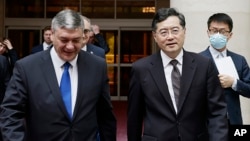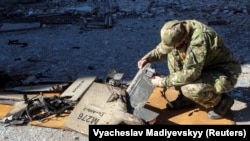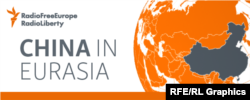
Welcome back to the China In Eurasia briefing, an RFE/RL newsletter tracking China's resurgent influence from Eastern Europe to Central Asia.
I'm RFE/RL correspondent Reid Standish and here's what I'm following right now.
What The Wagner Rebellion Means For Xi
The dust is still settling on the weekend mutiny launched by Yevgeny Prigozhin and his private Wagner mercenary group that shook Russia and exposed new cracks in Russian President Vladimir Putin's power at home.
But what does it mean for China and its leader, Xi Jinping, who has been Moscow's -- and Putin's -- strongest supporter since the February 2022 full-scale invasion of Ukraine?
Finding Perspective: As Wagner forces seized a major Russian military hub and ordered an armed march on Moscow on June 24, Chinese officials were silent. Chinese state media provided straight, factual coverage as events unfolded on the ground and, unsurprisingly, offered no sympathy for Prigozhin or Wagner, and instead largely echoed rhetoric from Putin's speech about the need for law, order, and stability.
It wasn't until Sunday, June 25 -- after the convoy to Moscow was turned around following a deal brokered by Belarusian ruler Alyaksandr Lukashenka between Putin and Prigozhin -- that Beijing broke its silence.
"This is a matter of Russia's domestic affairs," the Chinese Foreign Ministry said in a statement. "China supports Russia in safeguarding national stability and delivering development and prosperity."
That same day, Russian Deputy Foreign Minister Andrei Rudenko flew to Beijing for what was said to be a scheduled meeting, where he met with Chinese Foreign Minister Qin Gang.
"Under the strategic guidance of President Xi Jinping and President Vladimir Putin, the Chinese-Russian political trust has continued to deepen," Chinese Deputy Foreign Minister Ma Zhaoxu said following the meeting.
Why It Matters: Xi now has to balance continuing support for Putin with hedging for the possibility that the Russian leader's time in power could be cut short.
Xi's partnership with Putin is based on a cocktail of ideology and pragmatism, and several Chinese scholars have argued that Prighozin's rebellion could limit the pragmatic appeal of the Kremlin.
Yu Jianrong, a prominent Chinese public intellectual, posted a video to his more than 7 million Weibo followers of Russians in Rostov-on-Don reacting angrily to police moving into the city, where he suggested there was some level of public support for Wagner: "I really don't know what's going on in this country," he wrote.
Meanwhile, Yu Sui, a professor at the China Center for Contemporary World Studies, told the China Daily newspaper the mutiny "undoubtedly rings an alarm bell for Russia" and that the episode reminded him of "the Chinese saying about feeding a tiger and then inviting trouble."
Shen Dingli, a Shanghai-based international relations scholar, told the Guardian that he believed the events would lead to Russia's increased dependence on China and that Beijing would take "a more cautious stance on Russia."
As Minxin Pei, a professor at Claremont McKenna College, wrote in a recent piece for Bloomberg, the invasion and Putin's actions since have provided Xi with a steady stream of lessons "too precious not to learn" when it comes maintaining support of the military, the absence of private armies, and keeping less personalistic control of the state.
When it comes to Prigohzin's rebellion, Mei writes, it's "a reminder to Xi that nationalism is a double-edged sword."
Expert Corner: Taiwan's Prague Moment
Taiwanese Foreign Minister Joseph Wu recently made his second visit to Prague, where he spoke at a conference and sat front row to watch a speech by Czech President Petr Pavel, marking the first time a Taiwanese minister and European head of state shared a room together.
You can read my full report here, but I've chosen some notable passages by both Wu and Pavel:
Wu on China and Russia: "What we are witnessing is that the two authoritarian forces are collaborating with each other, trading ever more with each other, and feeding more into the hunger for expansion."
Wu on Europe's role: "In order for Taiwan to stay strong and resilient and to have the courage to continue the policy of maintaining the status quo, we do need support from our European friends."
Pavel on how Europe should engage with China: "We should do it the same way that China does to us. Let's not create dependencies. Let's do business and let's cooperate when it is beneficial to both sides -- but let's keep in mind that China's long-term interests and values are not compatible with ours."
Do you have a question about China's growing footprint in Eurasia? Send it to me at StandishR@rferl.org or reply directly to this e-mail and I'll get it answered by leading experts and policymakers.
Three more stories from Eurasia
1. A Softer Line From Brussels?
The European Union Council summit is set to take place later this week and, according to a leaked draft of the post-summit statement obtained by RFE/RL, the council is still juggling how best to handle its complex economic and geopolitical relationship with China.
The Details: The leaked draft mostly focuses on economic measures, reaffirming the 27-country bloc's "multifaceted policy approach toward China" and that "despite their different political and economic systems, the European Union and China have a shared interest in pursuing constructive and stable relations."
The document seen by RFE/RL for the June 29-30 meetings says the EU will continue with its de-risking plans and keep diversifying away from dependencies on China in critical industries, but it clarified that Brussels "does not intend to decouple or to turn inward."
After apparently walking back some tougher past rhetoric on the economic front, the draft also appears to adopt stronger language on Taiwan.
While reaffirming the bloc's "One-China policy," it states: "The East and South China Seas are of strategic importance for regional and global prosperity and security. The European Union is concerned about growing tensions in the Taiwan Strait. The European Council opposes any unilateral attempts to change the status quo by force or coercion."
2. The Latest On Montenegro's Chinese-Built and Finances Highway
Montenegro will end a deal with Western banks that protected it from increased debt on a controversial Chinese loan for nearly $1 billion used to build a highway, my colleague Lela Scepanovic from RFE/RL's Balkan Service reports.
What You Need To Know: The move is the latest chapter in the saga of Montenegro's controversial highway -- which was built by the China Road and Bridge Corporation (CRBC) and financed by the Export-Import Bank of China with an immense loan -- and created long-term economic risk by saddling the country with debts to Beijing that once totaled more than a third of the state budget.
In exiting the deal that converted its dollar debt to the Chinese bank into euros, the country's finance ministry said on June 14 that it "earned approximately $64 million" after reverting to the recently strengthened dollar.
The ministry said it will use that money to help make its next debt payment to China in January.
3. The 11th Sanctions Package
The EU adopted its 11th sanctions package on June 23 and for the first time added companies registered in China to its list of entities aiding Russia's war in Ukraine, although it limited the number at the last minute.
What It Means: The new sanctions package looked to hit third parties from circumventing existing restrictions, especially products like semiconductors and radio equipment given their potential military applications.
The EU list added companies registered in China -- specifically, Hong Kong -- Uzbekistan, the United Arab Emirates, Syria, and Armenia.
Eight Chinese companies were named in a draft document seen by RFE/RL, but five were removed after the Chinese government made a commitment to put pressure on them, according to a Reuters report.
Their removal may have stemmed from a reluctance within the EU to avoid aggravating ties with Beijing.
Across The Supercontinent
Kazakh Crosshairs: Bekzat Maksutkhan, the head of Naghyz Atajurt, an unregistered advocacy group in Kazakhstan that works with families who have relatives missing in China's vast repression system in Xinjiang, says he was questioned and fined by Kazakh authorities on June 19, RFE/RL's Kazakh Service reports.
Kazakh authorities have moved to silence activism around the treatment of ethnic Kazakhs in Xinjiang in recent years, and Maksutkhan is one of the few still working on the issue inside the country.
One More? Russian Deputy Prime Minister Aleksei Overchuk said in an interview that talks between the Eurasian Economic Union -- which comprises Armenia, Belarus, Kazakhstan, Kyrgyzstan, and Russia -- and Iran are in their final stages and could lead to a free trade agreement by the end of the year.
Chemical Central: According to leaked Hungarian government documents obtained by Direkt36, China is aiming to transport a significant part of its chemical production destined for Europe by rail to Hungary.
The plan, which is backed by the Hungarian government and in the later stages of negotiations, would look to supply Europe's battery factories and other industrial plants from Hungarian chemical trade hubs.
Middle Corridor: Kazakh Prime Minister Alikhan Smailov and his Georgian counterpart, Irakli Garibashvili, held new talks about increasing oil transit through Black Sea ports and building more infrastructure along the Middle Corridor that brings good to and from China and Europe, RFE/RL's Kazakh Service reports.
One Thing To Watch
Russia's war in Ukraine saw a flurry of sanctions unleashed on Moscow by the United States and its allies. But could the same be done for China after an invasion of Taiwan?
According to a new study by the Atlantic Council and Rhodium Group, the answer is yes in theory, but getting there may be too many obstacles to overcome.
Washington and its allies would face tough choices in deciding how far to go in pressuring Beijing, struggle to find unity among partners, and have to deal with a China that has more tools than Russia in being able to cushion the blow.
According to the study, sanctions against Chinese industry would likely be narrowly targeted at specific companies and industries where China is highly dependent on G7 countries but where the United States and its allies rely little on Chinese exports. One example mentioned is China's aerospace sector, which is heavily dependent on foreign-sourced engines and avionics.
That's all from me for now. Don't forget to send me any questions, comments, or tips that you might have.
Until next time,
Reid Standish
If you enjoyed this briefing and don't want to miss the next edition, subscribe here. It will be sent to your inbox every other Wednesday.





